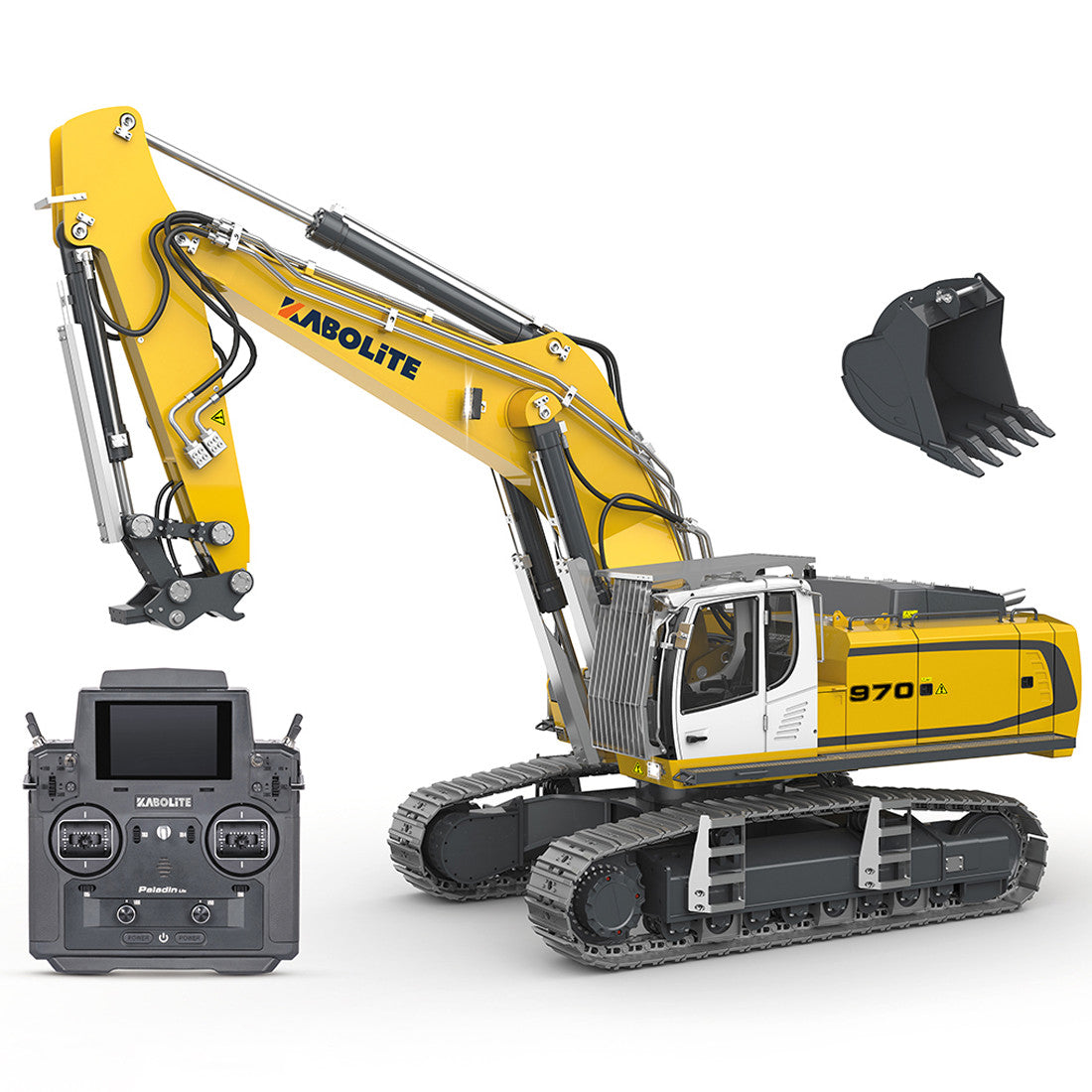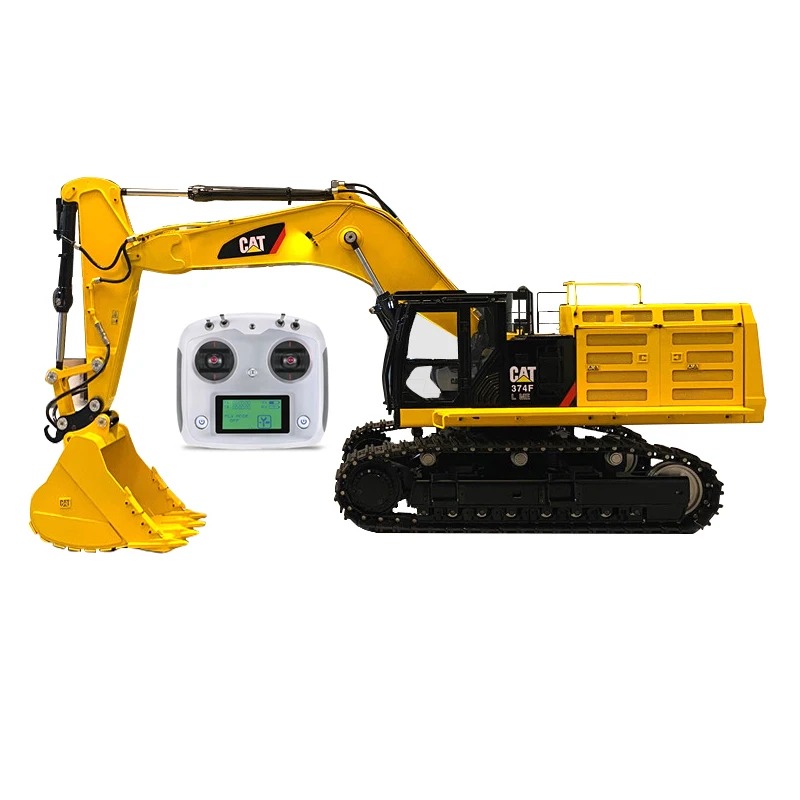10 Common Mistakes to Avoid When Operating a rc excavator
Wiki Article
Recognizing Exactly How Excavator Functions and Its Impact on Efficiency
Excavators play a necessary function in building and construction and mining operations, depending on a complex interaction of hydraulic and mechanical systems. Their capacity to execute a selection of jobs pivots on both their style and the innovation integrated within. Understanding these components can substantially affect operational performance and performance. As developments proceed to reshape the market, one have to think about just how these modifications will certainly affect future practices and performance.The Essentials of Excavator Mechanics

The Function of Hydraulic Solutions in Excavators
At the heart of excavator procedure exists the hydraulic system, which plays an essential duty in powering the maker's features and activities. This system makes use of pressurized hydraulic liquid to transfer energy, allowing different actions such as training, excavating, and swinging. By taking advantage of the concepts of hydraulics, excavators can do jobs with remarkable accuracy and pressure, boosting total functional efficiency.The hydraulic system contains key components, including pumps, cylinders, and shutoffs, which interact to control the flow and direction of the liquid. When the driver engages the controls, the hydraulic fluid is guided to details cylinders, converting the driver's commands right into physical motion. This mechanism enables smooth and responsive activities, which are essential in building and excavation environments. double e volvo rc excavator. The effectiveness of the hydraulic system directly influences the efficiency and flexibility of the excavator, making it an important aspect in modern-day excavation proceduresKey Components of an Excavator
Understanding the crucial elements of an excavator is vital for realizing how this effective maker runs. An excavator contains several substantial components, including the undercarriage, home, container, arm, and boom. The undercarriage supplies security and flexibility, frequently including wheels or tracks to navigate various surfaces. Your house consists of the engine and hydraulic systems, permitting the driver to manage motion and power the device. The boom extends from your home, making it possible for upright reach, while the arm connects to the container, helping with digging and lifting operations.Additionally, the taxi houses the operator, geared up with controls for precise maneuvering. Each of these parts plays an important function in the excavator's overall functionality, contributing to its effectiveness and effectiveness on construction websites. Comprehending these parts helps in enhancing and keeping excavator efficiency, making sure jobs are completed safely and successfully.Attachment Convenience and Its Benefits
Attachment convenience is an essential facet of excavators, making it possible for drivers to change in between various tools customized for particular tasks. This flexibility not just boosts job performance but likewise contributes to cost-effectiveness by reducing the need for multiple machines. Recognizing the different kinds of add-ons readily available can greatly impact the overall efficiency and performance of an excavator on work websites.Sorts of Attachments
While excavators are mainly recognized for their digging capacities, their real adaptability depends on the large selection of add-ons offered. These add-ons improve the excavator's functionality, permitting it to perform different jobs past excavation. Typical attachments consist of buckets (for digging and scooping), hydraulic thumbs (for realizing materials), and augers (for drilling openings) Grapples are made use of for relocating and dealing with debris, while rippers can break up hard surface areas. Other specialized accessories, such as trenchers and plows, make it possible for excavators to adjust to details task requirements. This diversity not just enhances the maker's utility across various markets, including demolition, landscape design, and building, but likewise permits operators to tailor their tools to satisfy particular job needs efficiently.Raised Work Efficiency
Making best use of job performance is a key advantage of using different excavator add-ons. Different add-ons permit an excavator to perform multiple jobs without requiring to switch tools, conserving important time and labor. Utilizing a hydraulic hammer can damage concrete while a pail accessory can dig deep into dirt, making it possible for a seamless operations. This convenience minimizes downtime related to equipment adjustments and improves productivity on-site. Furthermore, specialized attachments improve accuracy in jobs such as grading or landscape design, causing better results. The capability to adapt to different job needs not just enhances operations yet additionally minimizes the demand for extra machinery, guaranteeing that projects are finished swiftly and efficiently. In general, attachment convenience substantially adds to boosted work performance in excavation job.Cost-Effectiveness and Flexibility
Cost-effectiveness is a substantial benefit of using flexible excavator accessories. These attachments allow a solitary excavator to perform several jobs, lowering the demand for added equipment and labor - double e volvo rc excavator. By changing in between pails, hammers, and grapples, drivers can deal with numerous tasks, from digging to demolition, therefore making the most of equipment use. This flexibility not just lowers operational expenses but likewise minimizes downtime connected with transforming devices. In addition, the capability to personalize excavators with specialized add-ons improves efficiency, as they can efficiently handle diverse tasks according to task needs. In conclusion, the mix of cost-effectiveness and versatility in excavator add-ons adds to enhanced operational efficiency and source allowance in building and construction and excavation projects
Advanced Innovation in Modern Excavators
Modern excavators are increasingly furnished with sophisticated innovation that transforms excavation procedures. Automation improves procedures, while enhanced fuel efficiency decreases operational costs. Additionally, wise control systems enhance accuracy and safety and security, marking a substantial evolution in excavation devices.Automation in Excavation Processes
As excavation modern technology develops, automation has become a critical element in improving performance and accuracy on work sites. Modern excavators are furnished with innovative automated systems that help with jobs such as grading, digging, and trenching with very little driver intervention. These systems utilize sensing units, GPS, and device discovering formulas to guarantee exact placing and depth control, greatly lowering the margin for mistake. Additionally, automation permits operators to concentrate on critical decision-making as opposed to manual controls, bring about improved efficiency on the whole. Such developments not just simplify operations but additionally enhance safety by decreasing human mistake in complex operations. The integration of automation in excavation processes stands for a substantial innovation in building modern technology, driving the sector in the direction of higher efficiency and efficiency.Improved Fuel Efficiency
Advancements in technology have additionally brought about considerable renovations in gas efficiency for contemporary excavators. Modern machines are furnished with advanced engines that enhance power outcome while lowering gas intake. These engines make use of ingenious burning modern technologies, such as turbocharging and straight fuel injection, to improve efficiency and performance. In addition, lightweight products in building and construction lower general weight, permitting for less power expenditure during operation. The intro of variable rate controls enables operators to adjust engine efficiency according to certain tasks, additionally minimizing fuel usage. Consequently, these enhancements not only reduced functional expenses however additionally contribute to ecological sustainability by reducing discharges. In general, enhanced gas effectiveness in excavators is an important growth that boosts performance and financial viability in the building sector.Smart Control Equipment
While operators navigate significantly complex job sites, wise control systems in excavators have actually become essential devices for improving performance and accuracy. These sophisticated technologies utilize algorithms and sensors to keep an eye on numerous parameters such as lots weight, terrain problems, and operational efficiency. By immediately readjusting hydraulic features, wise systems optimize maker efficiency, bring about improved performance and minimized endure elements. Furthermore, operators gain from intuitive user interfaces that offer real-time feedback and diagnostics, enabling for informed decision-making. This combination of technology not only enhances operations but additionally minimizes human error, contributing to more secure job settings. As the building and construction sector continues to advance, clever control systems will certainly play an essential function in forming the future of excavator performance and performance.Enhancing Functional Effectiveness With Excavators
Excavators play a vital function in improving operational performance across numerous building and excavation tasks. Their versatility enables several tasks, including training, digging, and product handling, which simplifies process and minimizes the requirement for added equipment. With effective hydraulic systems, excavators can do sturdy tasks with accuracy, considerably lowering the time required to full projects. The integration of advanced modern technology, such as GPS and automated controls, even more optimizes their operation, making it possible for drivers to attain higher precision and reduce material waste. In addition, contemporary excavators are created to consume less fuel and decrease discharges, contributing to both expense financial savings and ecological sustainability. By using excavators successfully, building and construction groups can boost productivity, fulfill job due dates, and enhance total site monitoring. This multifunctionality and efficiency make excavators essential tools in the contemporary building and construction landscape.The Future of Excavators in Construction and Mining Industries
As the construction and mining industries advance, the future of excavators is poised for substantial improvement driven by technological advancement and changing operational needs. Developments in automation and synthetic knowledge are reshaping excavator capabilities, permitting improved precision and efficiency in operations. Autonomous excavators are arising, decreasing the demand for human intervention and reducing the threat of accidents.Moreover, the integration of telematics and IoT technology allows real-time tracking of equipment performance and anticipating maintenance, optimizing uptime. Environmentally friendly designs, consisting of hybrid and electric models, are acquiring grip, lining up with sustainability goals within the industry.Additionally, the usage of sophisticated materials and lighter styles enhances gas effectiveness while preserving performance criteria. As these trends progress, excavators will certainly play double e volvo rc excavator a crucial role in fulfilling the raising demands for performance and safety and security in construction and mining, ultimately changing functional landscapes.Frequently Asked Inquiries
How Do Weather Impact Excavator Efficiency?

Weather condition conditions substantially influence excavator performance, as rain and mud can hinder traction and security, while extreme temperatures might affect hydraulic systems. Operators must adapt to these variables to guarantee suitable performance and security during procedures.
What Precaution Should Operators Adhere To While Utilizing Excavators?
Safety procedures for excavator drivers consist of wearing ideal individual safety equipment, performing pre-operation assessments, guaranteeing proper communication with ground employees, keeping a secure range from overhead dangers, and sticking to recognized operational procedures to stop accidents.Exactly How Frequently Should Excavators Be Kept for Ideal Efficiency?
Excavators should be preserved frequently to assure peak performance, commonly every 250 operating hours or as specified by the supplier. Routine checks boost reliability, stop unanticipated break downs, and prolong the lifespan of the devices.
What Is the Ordinary Lifespan of an Excavator?
The typical life-span of an excavator generally varies from 10,000 to 15,000 hours of procedure. Elements affecting long life include maintenance methods, operating conditions, and the top quality of the equipment itself, impacting general performance and performance.
Can Excavators Operate Uneven Surface Effectively?
Excavators can run effectively on unequal surface because of their expressed designs and flexible tracks. These features enable them to keep stability and grip, enabling effective operation in difficult settings commonly come across in building and construction and landscaping jobs. Each of these parts plays an essential function in the excavator's total functionality, contributing to its performance and performance on construction sites. Optimizing job efficiency is a main benefit of making use of various excavator attachments. While operators navigate significantly intricate work sites, smart control systems in excavators have emerged as essential devices for improving efficiency and precision. Excavators play a necessary duty in enhancing operational efficiency across various building and excavation jobs. Developments in automation and fabricated intelligence are improving excavator capacities, allowing for enhanced precision and efficiency in operations.Report this wiki page